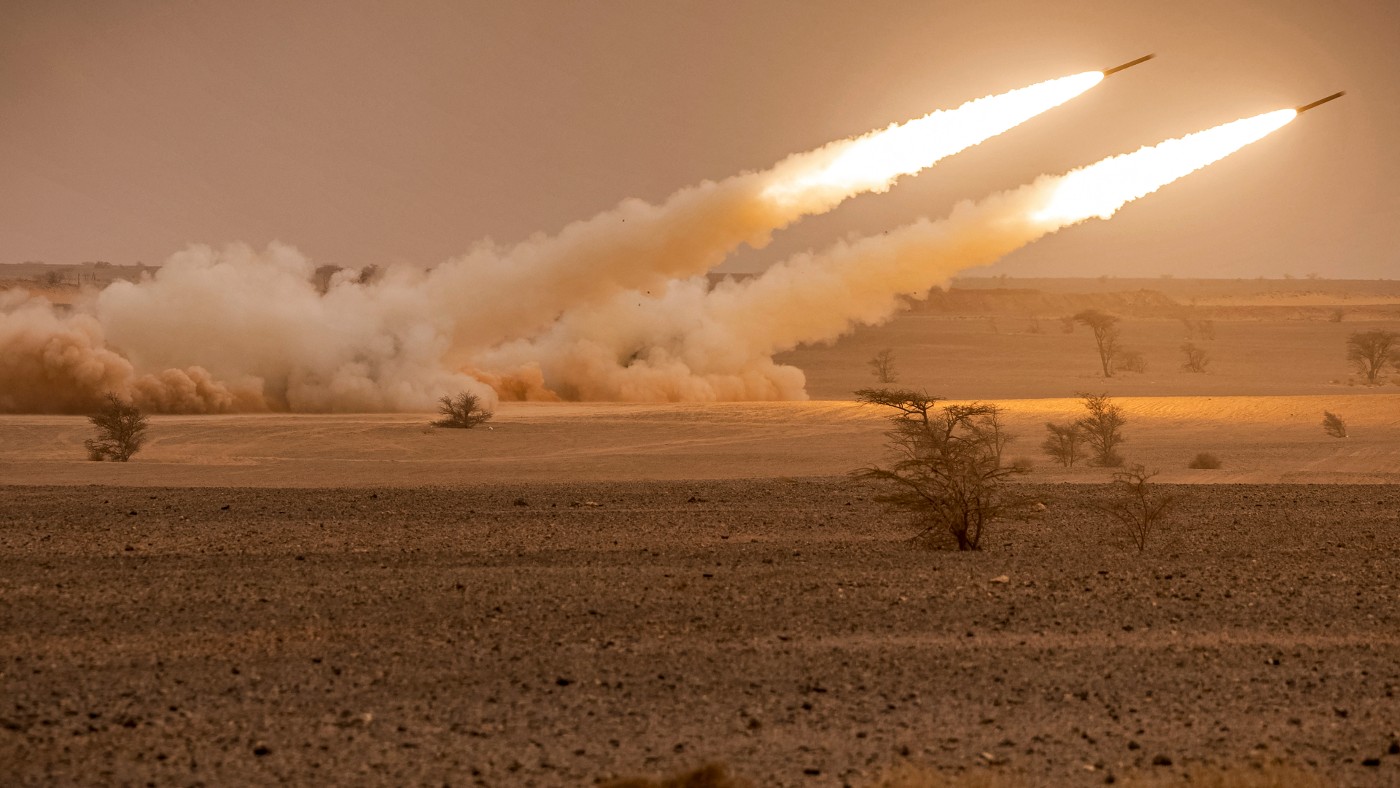What difference will Joe Biden’s advanced rocket systems make in Ukraine?
New weaponry could be a ‘game changer’ in Donbas region

A free daily email with the biggest news stories of the day – and the best features from TheWeek.com
You are now subscribed
Your newsletter sign-up was successful
Washington will send Ukraine more advanced rocket systems to help the country defend itself, Joe Biden has announced.
The US president said that the move will strengthen Kyiv’s negotiating position with Russia and make a diplomatic solution more likely, but Moscow said it viewed the development “extremely negatively”.
What is US sending?
Writing in The New York Times, Biden said the US “will provide the Ukrainians with more advanced rocket systems and munitions that will enable them to more precisely strike key targets on the battlefield in Ukraine”.
The Week
Escape your echo chamber. Get the facts behind the news, plus analysis from multiple perspectives.

Sign up for The Week's Free Newsletters
From our morning news briefing to a weekly Good News Newsletter, get the best of The Week delivered directly to your inbox.
From our morning news briefing to a weekly Good News Newsletter, get the best of The Week delivered directly to your inbox.
A senior White House official said the shipment will include the M142 High Mobility Artillery Rocket System (HIMARS), which can launch multiple precision-guided missiles at targets up to 45 miles away.
The HIMARS range is far longer than anything in Ukraine’s current artillery and they are believed to be more accurate than their Russian equivalents.
This package of military aid, the eleventh approved by the US for Ukraine since the invasion began in February, will also include helicopters, anti-tank weapons, tactical vehicles and spare parts.
What isn’t the US sending?
White House officials say they agreed to provide the rockets only after gaining assurances from President Volodymyr Zelenskyy that the weapons would not be used to attack targets inside Russia.
A free daily email with the biggest news stories of the day – and the best features from TheWeek.com
The longest-range munition the new systems are capable of firing – MGM-140 Advanced Tactical Missile System (ATACMS), with a maximum range of 186 miles – will therefore not be included in the package, noted Forbes.
“We are not going to send to Ukraine rocket systems that can strike into Russia,” Biden wrote. He added that the US “will not be directly engaged in this conflict, either by sending American troops to fight in Ukraine or by attacking Russian forces”.
However, Moscow was not placated by these words. Deputy Foreign Minister Sergei Ryabkov told the Ria news agency: “We view this extremely negatively, because attempts to present the decision as containing elements of ‘self-restraint’ are useless.”
How will it help?
The BBC’s diplomatic correspondent, Paul Adams, wrote that Ukrainian forces in the Donbas region have complained that they lack firepower.
He believes the new systems could therefore be “game-changers” as their GPS-guided rockets are much more accurate than the equivalent Russian systems, and much quicker to reload, and the launch vehicles can move quickly from one location to another.
The Telegraph added that Ukrainian forces will use the rockets in the eastern Donbas region to intercept Russian artillery, and take out Russian positions in areas including the city of Severodonetsk.
-
 The ‘ravenous’ demand for Cornish minerals
The ‘ravenous’ demand for Cornish mineralsUnder the Radar Growing need for critical minerals to power tech has intensified ‘appetite’ for lithium, which could be a ‘huge boon’ for local economy
-
 Why are election experts taking Trump’s midterm threats seriously?
Why are election experts taking Trump’s midterm threats seriously?IN THE SPOTLIGHT As the president muses about polling place deployments and a centralized electoral system aimed at one-party control, lawmakers are taking this administration at its word
-
 ‘Restaurateurs have become millionaires’
‘Restaurateurs have become millionaires’Instant Opinion Opinion, comment and editorials of the day
-
 Witkoff and Kushner tackle Ukraine, Iran in Geneva
Witkoff and Kushner tackle Ukraine, Iran in GenevaSpeed Read Steve Witkoff and Jared Kushner held negotiations aimed at securing a nuclear deal with Iran and an end to Russia’s war in Ukraine
-
 How corrupt is the UK?
How corrupt is the UK?The Explainer Decline in standards ‘risks becoming a defining feature of our political culture’ as Britain falls to lowest ever score on global index
-
 ‘The mark’s significance is psychological, if that’
‘The mark’s significance is psychological, if that’Instant Opinion Opinion, comment and editorials of the day
-
 ‘Bad Bunny’s music feels inclusive and exclusive at the same time’
‘Bad Bunny’s music feels inclusive and exclusive at the same time’Instant Opinion Opinion, comment and editorials of the day
-
 The ‘mad king’: has Trump finally lost it?
The ‘mad king’: has Trump finally lost it?Talking Point Rambling speeches, wind turbine obsession, and an ‘unhinged’ letter to Norway’s prime minister have caused concern whether the rest of his term is ‘sustainable’
-
 The high street: Britain’s next political battleground?
The high street: Britain’s next political battleground?In the Spotlight Mass closure of shops and influx of organised crime are fuelling voter anger, and offer an opening for Reform UK
-
 Vance’s ‘next move will reveal whether the conservative movement can move past Trump’
Vance’s ‘next move will reveal whether the conservative movement can move past Trump’Instant Opinion Opinion, comment and editorials of the day
-
 What have Trump’s Mar-a-Lago summits achieved?
What have Trump’s Mar-a-Lago summits achieved?Today’s big question Zelenskyy and Netanyahu meet the president in his Palm Beach ‘Winter White House’